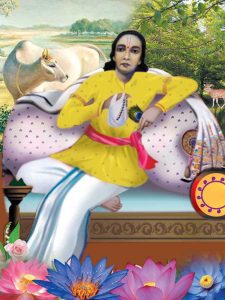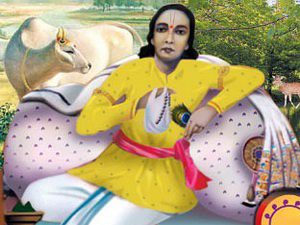Pundarika Vidyanidhi
 by Srila Bhakti Raksaka Sridhara Maharaja
by Srila Bhakti Raksaka Sridhara Maharaja
Student: Guru Maharaj, I have one question. In caitanya-lila the Spiritual Master of Gadadhara Pandit is Pundarika Vidyanidhi. But what is Pundarika Vidyandhi’s position in Krsna-lila?
Srila Sridhar Maharaj: Gadadhara Pandit has been considered to be Radharani’s incarnation; and Pundarika Vidyanidhi is considered to be Vrsabhanu-raj, the father of Radharani, in krsna-lila.
Student: Pundarika Vidyanidhi has such uncommon pastimes. They are very difficult to understand…
Srila Sridhar Maharaj: He is paramahamsa. Different devotees have come in this world, to show different type of bhajan. Bhajan is the common factor of them all, of all such extraordinary devotees they are all fully devoted but they are showing themselves as different types, different models. So all are not one and the same. But their common end, Krsna consciousness that is to be considered, to be judged. From all positions, if one is directed totally towards Krsna consciousness, then he is well, he is properly situated.
Suppose there are many patients suffering from the same disease. The doctor may not advise everyone to take the same diet. It will be similar, but not the same; according to the taste and the capacity or condition of the stomach, one patient is given one thing, another something else. Similarly, the aim of those who are going towards Krsna consciousness is as one, but the physical arrangements may be little different. So in the case of the paramahamsas, devotees of extraordinary characteristic, their activities should not be considered, should not be judged in relation to the general standard of what is considered good and bad.
One example of this is Pundarika Vidyanidhi. Gadadhara Pandit in his youth was always very eager to see sadhus; so one day Mukunda asked him: “Would you like to go and see a sadhu, to visit him? I know of a good sadhu, I can take you.” “Yes, yes, take me to him!”
So Mukunda brought him there. And Gadadhara Pandit saw that Pundarika Vidyanidhi was sitting on a very soft bed with the finest covers, he was smoking an elaborately carved pipe, his hair was styled very beautifully and his clothes were of the most expensive style and cut. Gadadhara thought, “Oh! What sort of sadhu has Mukunda brought me to see?” He had some hestitation in his mind, some doubt. And Mukunda knew this, he could feel it. So he chanted one sloka from Srimad Bhagavatam:
aho bakiyam sthana-kala-kutam
jighamsayapayayad apy asadhvi
lebhe gatim dhatry-ucitam tato ‘nyam
kam va dayalum saranam vrajema
(S.Bhag.3:2:23 )
In this verse Uddhava is speaking to Vidura: “Whom should I worship, except Krsna? His magnanimity is so great, that when one lady, Putana, came to kill Him by poison, she was given the position as mother to Him, in His domain. Amongst those who are worshipable, He is the most magnanimous personality. Whom shall I have as my worshipable Lord, greater than this?”
This sloka created some movement in the heart of Pundarika Vidyanidhi, and despite his external appearance, gradually something else began to show itself. Throwing away the valuable smoking-pipe, he began to shred his expensive clothing, and his bedding; he began to tear his well-decorated hair, and show many different kinds of extraordinary behaviour. Then he began to roll on the ground, his body in spasm stage; and words from that verse: ‘kam va dayalum… saranam vrajema… aho bakiyam…’ such sounds were coming intermittently from Pundarik’s mouth.
Then Gadadhara Pandit thought: “Oh! Even a small sentiment, a tiny sentiment about the magnanamity of Krsna can produce so much revolution in his heart! So, he must be a great devotee…” In this way Gadadhara Pandit began to understand the dignity, the dignified position of Pundarik Vidyanidhi.
So, it is not always that ‘the man may be known by his dress.’ For Pundarika Vidyanidhi, his opulent appearance and activity is all only an outer showing, he does not care, he has no attachment for it to him, everything is one and the same. It is one and the same. He is only showing such a fashion, such an opulent fashion, externally, formally; but he is not a slave to those things to beautiful clothes, or hair, or any other such thing.
Similarly, it is told about Rajarsi Janaka: if he should have one hand on the soft breast of a lady, and another hand in the fire, there is no change, no disturbance in his consciousness. Both cases both enjoying and suffering are the same to him. Softness, and burning sensation, he is tolerating both. So, if a man who can tolerate the pain of fire-burning, puts his hand on the soft part of the lady, it is nothing to him. The inner man is otherwise engaged; the outward manifestation is only an external posture and it cannot affect him at all. It cannot touch him, cannot disturb him from his aim, from his engagement.”

